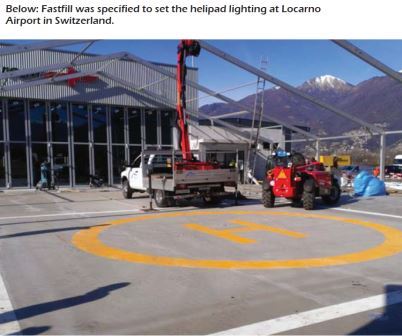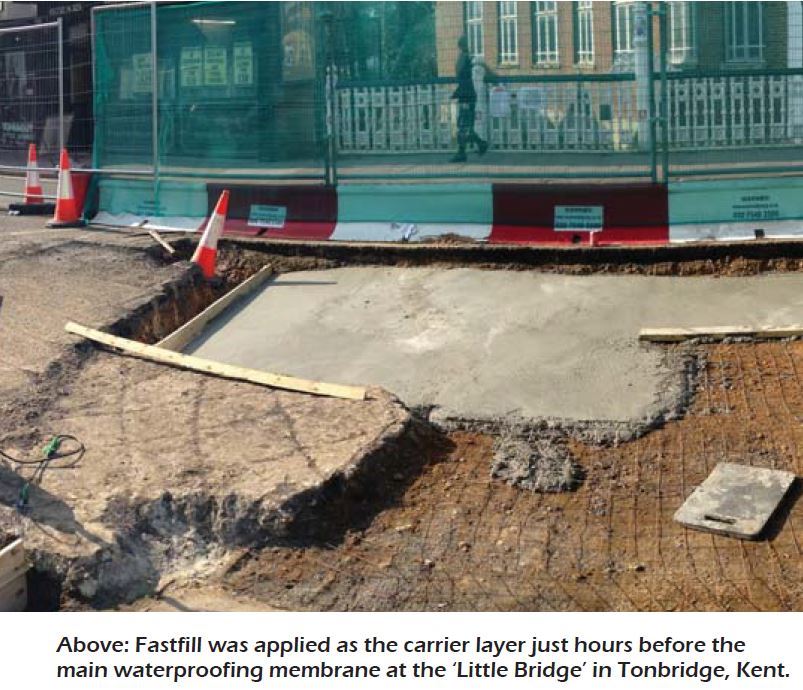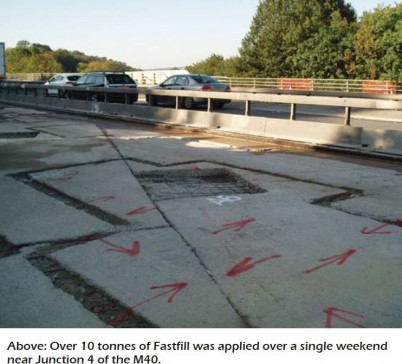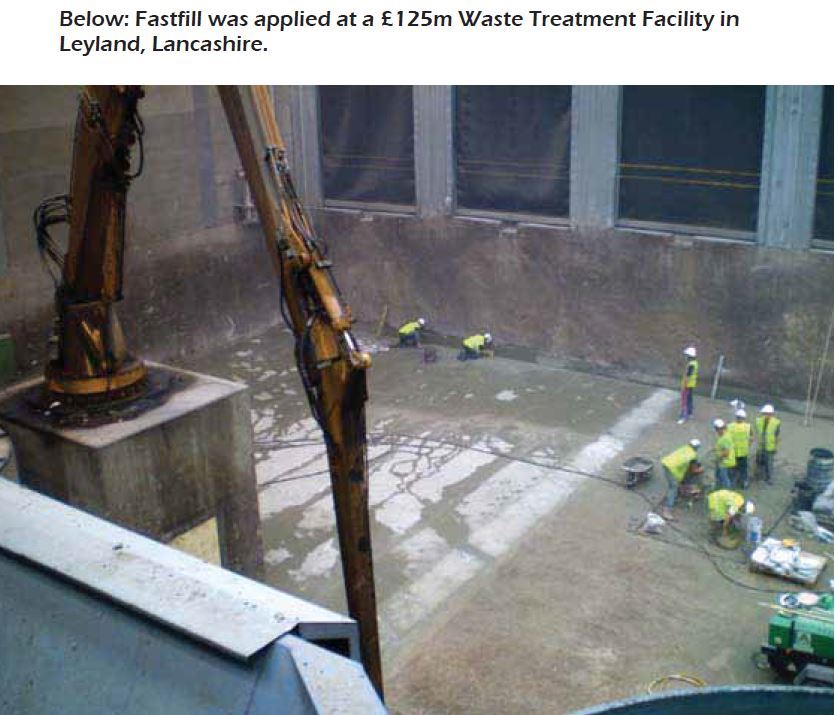It is often difficult to carry out repairs to the concrete floors or decks of highways and trafficked industrial areas due to demanding service conditions and limited time constraints, but it is particularly challenging when repairs are carried out during the winter period. Cold temperatures can prevent repair materials from curing and developing physical strength, which can be severely disruptive and expensive when trafficked areas need to return to normal service as quickly as possible.
When water freezes, standard concrete repair mortars will expand and this expansion due to freezing can rapidly lead to cracking. Wet or ice-covered surfaces also prevent a good bond from developing between the repair mortar and the original concrete deck. It is therefore crucial to specify fast setting concrete repair materials that will cure normally when temperatures dip below 0°C.
Traditionally, rapid-setting mortars have been formulated from high-alumina cement modified with strong alkalis, which interact violently to accelerate the setting. However, these have proven to be variable in performance with unreliable setting and high shrinkage.
Shrinkage-compensated repair mortars
Alternative products have been developed using Portland cement technology modified with calcium sulfoaluminate and anhydrite to produce rapid hardening, shrinkage compensated repair mortars. The setting characteristics are reliably controlled using a combination of carbonate-ba sed accelerators and carboxylic acid retarders, which are not adversely affected by extremes of temperature.
sed accelerators and carboxylic acid retarders, which are not adversely affected by extremes of temperature.
This early hydration activity is not at the expense of later strength development and the silicate phases in the Portland cement continue to hydrate to provide a dense gel structure. This is enhanced by modification with advanced styrene acrylic copolymers and pozzolanic additives, which ensure high impermeability to water even under 10 bar hydrostatic pressure. The addition of fibres enhances flexural strength and impact resistance, making the cementitious mortars ideal for use in high-demanding flooring and repair applications.
One such concrete repair mortar is Fastfill, a single-component Portland-cement-based structural mortar, which cures normally at temperatures as low as –10°C. It can be rapidly applied up to 100mm or for full section repairs up to 300mm when bulked out with sand or aggregate, and an application of just 7.5mm of Fastfill provides the same level of waterproofing as 1000m of typical concrete. It rapidly develops strength, allowing foot traffic within 45 minutes and forklift traffic within two hours, ultimately achieving a compressive strength of 60MPa within 28 days. With no need for substrate or inter-layer priming, it is non-toxic when cured and presents no hazards during application.
Examples of applications
The benefits of rapid curi
A challenging project was recently undertaken on a helipad at Locarno Airport in Switzerland for Rega, the Swiss Air-Rescue Service, which comes to the medical aid of people in distress. Due to the location of the helicopter base at the foot of the Swiss Alps, the climatic conditions are extremely aggressive, particularly in winter when the helicopters have to land with snow skids due to the snow and icy conditions.
A hard-wearing, waterproof flooring system was required for the protection of the 450m² helipad and due to the harsh weather, the chosen system needed to be able to withstand freeze–thaw attack without deterioration. Time was of the essence as Rega is on standby 24 hours a day, 365 days a year, ready to respond to emergency calls – both in Switzerland and further afield. A cementitious flooring system was specified but prior to its application, Fastfill was used to help
In the UK, extensive concrete floor repair work has been carried out throughout the motorway network for the Highways Agency or the respective local authorities. One such project was undertaken on the M60 between Junctions 1 and 2 at Stockport in Greater Manchester, where there was spalling of the concrete surfacing and corrosion of the reinforcement on the main concrete carriageway. To minimise disruption on this busy section of carriageway, the work was scheduled to be carried out during overnight closures, starting at 10.30pm with the carriageway being open again at 6am the following morning. The contractor, Interserve, was required to carry out compressive strength tests on cubes of the concrete repair mortar to confirm that the repair was capable of taking the traffic loads. Throughout the contract, even in freezing conditions an average compressive strength of 28.5MPa was achieved within just 2½ hours, enabling the carriageway to be opened on schedule.
Meanwhile on Handy Cross Bridge near Junction 4 of the M40 at High Wycombe, contractor Volker Laser was required to apply more than 10 tonnes of Fastfill over a single weekend. When planing the concrete bridge deck in preparation for the application of a waterproof membrane, too much concrete cover was removed and emergency repairs were needed to reinstate protection to the steel reinforcement and build up the concrete cover. The rapid setting properties of the concrete repair mortar were crucial for this project, in order to minimise disruption to traffic on this busy motorway. The mortar was specified as an overlay at an average thickness of 25mm for an area of 300m², and for deeper patch repairs it was bulked out with sand.
On other highways and bridge projects, waterproofing membranes have been able to be applied the day after the application of a fast-setting concrete repair mortar. One example is the ‘Little Bridge’ in Tonbridge, Kent, where Fastfill was applied as the carrier layer just hours before the main waterproofing membrane. Rapid-setting properties and early strength development are essential for many transport-related projects, as demonstrated by an application on Manchester’s Metrolink tramway system. Fastfill was used to infill the concrete base of the tram rails and was able to be applied on overnight shift
Rapid-setting repair mortars are also commonly used in industrial applications, especially loading bays. At Lancashire’s modern £125m waste treatment facility in Leyland, the concrete on the floors had broken through to the steel reinforcement within a year of the facility opening, due to front loaders loading waste onto conveyors.
With a time window of just four days available for repairs to an area in excess of 400m², Fastfill was chosen due to its ability to be applied directly to the saturated concrete substrate without a primer and provide a durable, high-strength repair with excellent resistance to abrasion and chemical attack.
Rapid-setting cementitious mortars can play an important role in allowing concrete floor repairs to be carried out in extreme weather conditions and with very limited time windows.
[Download not found]

